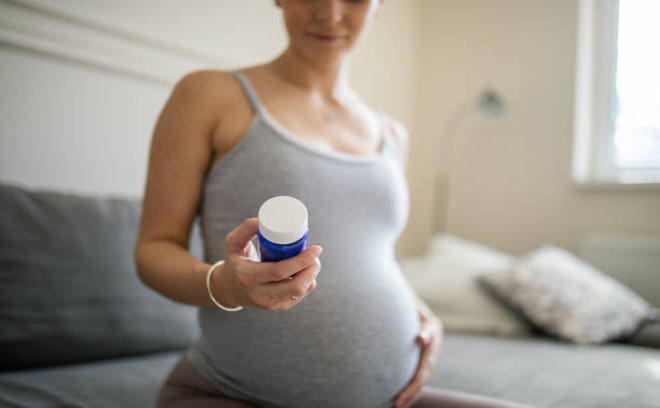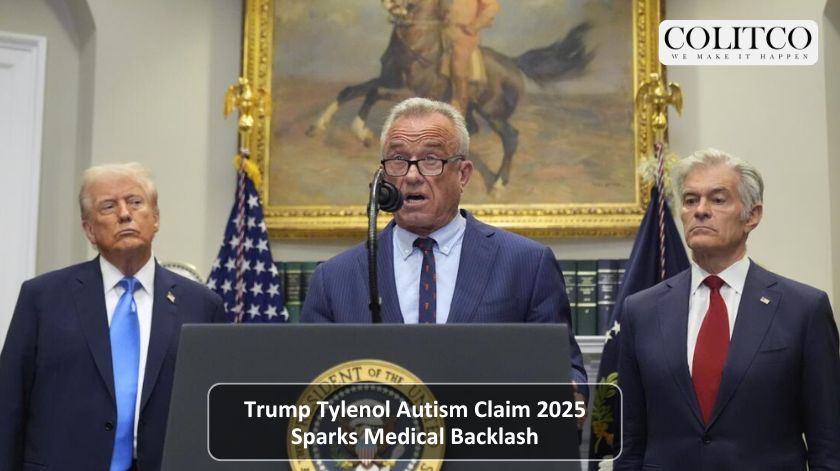Donald Trump’s recent remarks linking Tylenol consumption during pregnancy with the risk of autism have revived controversy around women’s autonomy, maternal well-being, and medical expertise. In a White House press conference, the president repeatedly asserted that pregnant women “tough it out” instead of using acetaminophen, which has concerned doctors, women’s rights organizations, and advocacy groups.
Trump’s Remarks on Tylenol and Autism
During a news conference to discuss autism, Donald Trump autism comments in 2025 made a controversial remark to pregnant women. He warned women not to use Tylenol, although it is one of the few pain medications that is recommended to pregnant women.

Trump argued that pregnant women must endure discomfort rather than reach for the medicine cabinet. “Fight like hell not to take it,” he insisted, but went on to insert the caveat that it was up to women to “work out with themselves.” His persistent insistence that mothers avoid acetaminophen has alarmed medical experts and women’s health groups.
Reaction From Women and Advocacy Groups
Some women decried the comments as just another instance of men dictating to women how much hurt they must endure. Amanda Tietz, a Wisconsin women’s rights activist, said the “tough it out” message was dismissive of the risks of fever in pregnancy.

Former U.S. Surgeon General Jerome Adams also denounced the gathering as shaming pregnant women, mothers of autistic kids, and autistic people themselves. His announcement urged compassion and less stigmatizing terminology, part of a wider criticism of the paternalistic tone of the remarks.
Concerns Raised by Medical Experts
Medical professionals reaffirmed that if left untreated, fever or severe pain during pregnancy would damage the mother and child. Dr. Nicole B. Saphier of Memorial Sloan Kettering Cancer Center noted that moderation is always the best policy, but Trump’s solution was oversimplified to the point of being thoughtless and not addressing real health concerns.
Other experts indicated the recommendation to avoid Tylenol with no alternatives is filled with risky outcomes. The suggestion has been explicit for decades that acetaminophen in small amounts under physician monitoring is safe during fever or pain medication when pregnant.
Reactions From Medical Organisations
Both the American College of Obstetricians and Gynaecologists (ACOG) and the Society for Maternal-Fetal Medicine (SMFM) also released statements maintaining Tylenol’s safety during pregnancy. They said that acetaminophen remains the safest option available and is widely used to manage conditions that would otherwise jeopardize pregnancy.

SMFM also explained that evidence does not favor a causal association between Tylenol exposure during pregnancy and autism risk. They reaffirmed that maternal fever has many more risks than hypothetical risks from acetaminophen exposure.
FDA Statement and Scientific Debate
The U.S. Food and Drug Administration (FDA) issued a letter to physicians acknowledging research suggesting a seeming link between Tylenol and autism. But it reaffirmed that no cause has been identified. The agency described the question as an ongoing scientific debate and called for patient-physician discussions when making treatment decisions.

Dr. Paul Offit of the Children’s Hospital of Philadelphia considered Trump’s claim to be “dangerous misinformation.” He identified that fever left untreated, particularly in the first trimester, results in developmental issues, further lending evidence to the role of acetaminophen in managing maternal health.
Kenvue’s Stand regarding Tylenol Safety
Kenvue, the Tylenol manufacturer, strongly refuted any proof of a link between acetaminophen and autism. The company refused that there is any scientific evidence to prove such a connection and was worried about the health consequences of discouraging its use.
Their statement demanded that in the absence of acetaminophen, women would be exposed to unsafe alternatives or have to go through a fever with documented risks, including preeclampsia, preterm delivery, and miscarriage.
Historical Background of Blaming Mothers
Historians and activists referenced a cyclical history of attributing children’s sickness to mothers. Alison Singer of the Autism Science Foundation explained that Trump’s remark followed outdated theories that have historically blamed mothers for autism.
Johns Hopkins University professor Mary E. Fissell added further that such remarks are part of a long and widespread blaming of maternal behavior for illnesses, an attitude that was rooted deep in historical myths about the reproductive role of women.
Also Read: Trump Delivers Confrontational Address at the United Nations 2025
Final Thoughts
The Trump Tylenol autism claim of 2025 provoked angry responses from physicians, advocacy groups, and major health organizations. Although Trump recommended pregnant women avoid acetaminophen, doctors continue to recommend cautious use under supervision.
As women’s health and autonomy are already hot topics in American politics, the backlash over the use of Tylenol in pregnancy and autism risk will likely persist. In the interim, however, medicine remains unshaken: acetaminophen remains a safe and essential therapy for fever and pain relief during pregnancy.
FAQs
- Does taking Tylenol during pregnancy cause autism?
Current data do not support a causal link between Tylenol use in pregnancy and autism. Some studies find associations, but experts argue these are due to other factors, not direct causation. - What did Trump claim about Tylenol and autism in 2025?
Donald Trump claimed that pregnant women should avoid Tylenol, suggesting it might be linked to autism. He urged expectant mothers to “tough it out” rather than use it, framing the choice as a personal decision. - Is acetaminophen (paracetamol) safe during pregnancy?
Yes. Acetaminophen remains one of the few pain relievers considered relatively safe when used for short-term pain or fever at recommended doses. Medical organisations caution that avoiding treatment for conditions such as high fever can be dangerous. - What does the latest research say about acetaminophen in pregnancy and autism?
Large studies, including sibling-control research, have found no increased risk of autism or neurodevelopmental disorders. Other studies have reported associations, but evidence remains inconclusive and affected by confounding factors. - Why are critics saying Trump’s statements on Tylenol are irresponsible?
Experts argue that discouraging the use of Tylenol could put mothers and babies at risk by leaving fevers untreated. Critics also say his message was delivered in a simplistic and paternalistic way, overlooking important medical nuance.












